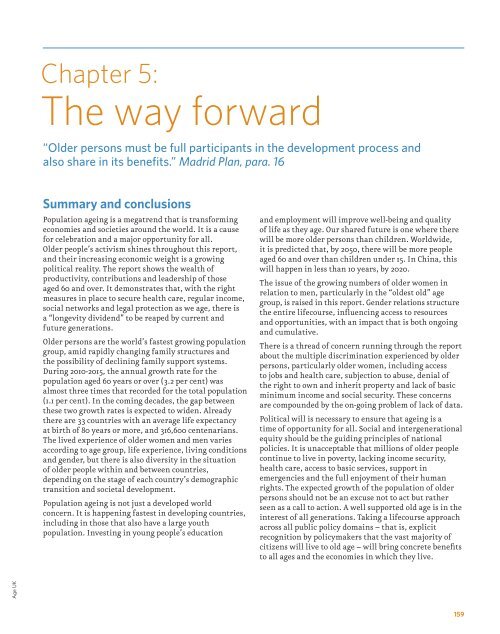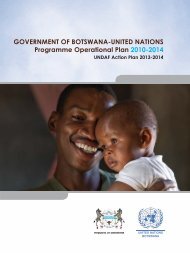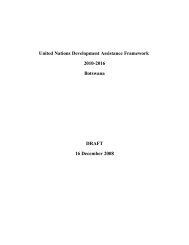Ageing in the Twenty-First Century: - HelpAge International
Ageing in the Twenty-First Century: - HelpAge International
Ageing in the Twenty-First Century: - HelpAge International
You also want an ePaper? Increase the reach of your titles
YUMPU automatically turns print PDFs into web optimized ePapers that Google loves.
Chapter 5:<br />
The way forward<br />
“Older persons must be full participants <strong>in</strong> <strong>the</strong> development process and<br />
also share <strong>in</strong> its benefits.” Madrid Plan, para. 16<br />
Summary and conclusions<br />
Population age<strong>in</strong>g is a megatrend that is transform<strong>in</strong>g<br />
economies and societies around <strong>the</strong> world. It is a cause<br />
for celebration and a major opportunity for all.<br />
Older people’s activism sh<strong>in</strong>es throughout this report,<br />
and <strong>the</strong>ir <strong>in</strong>creas<strong>in</strong>g economic weight is a grow<strong>in</strong>g<br />
political reality. The report shows <strong>the</strong> wealth of<br />
productivity, contributions and leadership of those<br />
aged 60 and over. It demonstrates that, with <strong>the</strong> right<br />
measures <strong>in</strong> place to secure health care, regular <strong>in</strong>come,<br />
social networks and legal protection as we age, <strong>the</strong>re is<br />
a “longevity dividend” to be reaped by current and<br />
future generations.<br />
Older persons are <strong>the</strong> world’s fastest grow<strong>in</strong>g population<br />
group, amid rapidly chang<strong>in</strong>g family structures and<br />
<strong>the</strong> possibility of decl<strong>in</strong><strong>in</strong>g family support systems.<br />
Dur<strong>in</strong>g 2010-2015, <strong>the</strong> annual growth rate for <strong>the</strong><br />
population aged 60 years or over (3.2 per cent) was<br />
almost three times that recorded for <strong>the</strong> total population<br />
(1.1 per cent). In <strong>the</strong> com<strong>in</strong>g decades, <strong>the</strong> gap between<br />
<strong>the</strong>se two growth rates is expected to widen. Already<br />
<strong>the</strong>re are 33 countries with an average life expectancy<br />
at birth of 80 years or more, and 316,600 centenarians.<br />
The lived experience of older women and men varies<br />
accord<strong>in</strong>g to age group, life experience, liv<strong>in</strong>g conditions<br />
and gender, but <strong>the</strong>re is also diversity <strong>in</strong> <strong>the</strong> situation<br />
of older people with<strong>in</strong> and between countries,<br />
depend<strong>in</strong>g on <strong>the</strong> stage of each country’s demographic<br />
transition and societal development.<br />
Population age<strong>in</strong>g is not just a developed world<br />
concern. It is happen<strong>in</strong>g fastest <strong>in</strong> develop<strong>in</strong>g countries,<br />
<strong>in</strong>clud<strong>in</strong>g <strong>in</strong> those that also have a large youth<br />
population. Invest<strong>in</strong>g <strong>in</strong> young people’s education<br />
and employment will improve well-be<strong>in</strong>g and quality<br />
of life as <strong>the</strong>y age. Our shared future is one where <strong>the</strong>re<br />
will be more older persons than children. Worldwide,<br />
it is predicted that, by 2050, <strong>the</strong>re will be more people<br />
aged 60 and over than children under 15. In Ch<strong>in</strong>a, this<br />
will happen <strong>in</strong> less than 10 years, by 2020.<br />
The issue of <strong>the</strong> grow<strong>in</strong>g numbers of older women <strong>in</strong><br />
relation to men, particularly <strong>in</strong> <strong>the</strong> “oldest old” age<br />
group, is raised <strong>in</strong> this report. Gender relations structure<br />
<strong>the</strong> entire lifecourse, <strong>in</strong>fluenc<strong>in</strong>g access to resources<br />
and opportunities, with an impact that is both ongo<strong>in</strong>g<br />
and cumulative.<br />
There is a thread of concern runn<strong>in</strong>g through <strong>the</strong> report<br />
about <strong>the</strong> multiple discrim<strong>in</strong>ation experienced by older<br />
persons, particularly older women, <strong>in</strong>clud<strong>in</strong>g access<br />
to jobs and health care, subjection to abuse, denial of<br />
<strong>the</strong> right to own and <strong>in</strong>herit property and lack of basic<br />
m<strong>in</strong>imum <strong>in</strong>come and social security. These concerns<br />
are compounded by <strong>the</strong> on-go<strong>in</strong>g problem of lack of data.<br />
Political will is necessary to ensure that age<strong>in</strong>g is a<br />
time of opportunity for all. Social and <strong>in</strong>tergenerational<br />
equity should be <strong>the</strong> guid<strong>in</strong>g pr<strong>in</strong>ciples of national<br />
policies. It is unacceptable that millions of older people<br />
cont<strong>in</strong>ue to live <strong>in</strong> poverty, lack<strong>in</strong>g <strong>in</strong>come security,<br />
health care, access to basic services, support <strong>in</strong><br />
emergencies and <strong>the</strong> full enjoyment of <strong>the</strong>ir human<br />
rights. The expected growth of <strong>the</strong> population of older<br />
persons should not be an excuse not to act but ra<strong>the</strong>r<br />
seen as a call to action. A well supported old age is <strong>in</strong> <strong>the</strong><br />
<strong>in</strong>terest of all generations. Tak<strong>in</strong>g a lifecourse approach<br />
across all public policy doma<strong>in</strong>s – that is, explicit<br />
recognition by policymakers that <strong>the</strong> vast majority of<br />
citizens will live to old age – will br<strong>in</strong>g concrete benefits<br />
to all ages and <strong>the</strong> economies <strong>in</strong> which <strong>the</strong>y live.<br />
Age UK<br />
159







